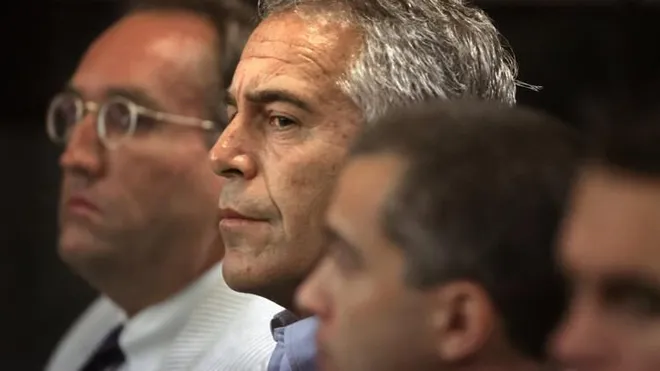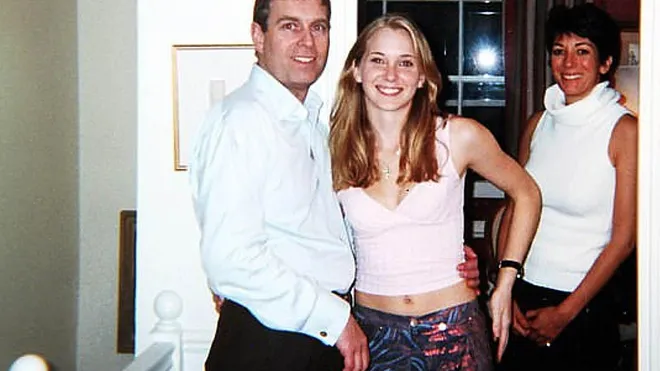'What you're doing is wrong': Grand jury blamed Epstein's teen victim, transcript shows
WEST PALM BEACH, Fla. – After hearing about the sex abuse Jeffrey Epstein committed on a 14-year-old girl in his Palm Beach mansion, the prosecutors and jurors tasked with holding him accountable seemed intent on teaching his victim a lesson instead.
Transcripts released Monday of the long-guarded grand jury proceedings contain unusual exchanges between prosecutors and a victim they called to testify. Assistant State Attorney Mary Ann Duggan interrupted the girl to ask what kind of bra and underwear she wore to the financier's home and later suggested she "had a problem with drugs."
Duggan pressed the teen over discrepancies in her initial statement to investigators and her testimony before the grand jury. When asked why she didn’t originally tell police that Epstein used a vibrator on her, the girl said she’d been scared to.
“So you didn’t want to admit that you had allowed him to touch you?” Duggan asked.
Yes, the girl replied.

More:Jeffrey Epstein 2006 grand jury documents are public. Read for yourself what happened
Duggan questioned the girl about her MySpace profile, reading aloud lines that cast her as a wayward teenager. She’d smoked pot and shoplifted, Duggan said. She listed beer as her choice of alcohol. She had four piercings.
Duggan's remarks set the stage for the rapid-fire questions jurors asked the girl soon after.
“Do you have any idea, deep down inside of you, that you – what you’re doing is wrong?" a juror asked.
"Have you set the goals to not do it anymore?" one asked. "And you’re well aware (of) what you’re doing to your own reputation?”
Assistant State Attorney Lanna Belohlavek, Duggan's co-counsel, joined the fray: “You’re aware that you committed a crime?”
The teenager answered "yes" to each one. The questions – posed more like accusations – continued, mostly aimed at the girl's judgment. Did it ever occur to her that Epstein could have "hacked you up?" one asked.
"Now I think about it, a lot of things could have happened," the girl said. "I thought about it a lot."
A juror interrupted her: "Should give it a little further thought."

Federal prosecutors worked with Epstein attorneys on 'deal of the century'
The Palm Beach Post, part of the USA TODAY Network, sued for the release of the grand jury transcripts in 2019 after it found that then-Palm Beach County State Attorney Barry Krischer undermined his own case against Epstein. According to state attorney documents, his office never spoke with any of the victims. Once Epstein's famous defense attorneys came to town, prosecutors stopped communicating regularly with police.
Krischer could have charged Epstein directly but opted instead to let a grand jury weigh the evidence against him. Grand juries, unlike trial juries, decide whether and how a defendant should be charged. Epstein's was the first sex crime in Palm Beach County handled this way.
The grand jury indicted Epstein on only one charge – felony solicitation of prostitution. Their decision did not reflect the fact that police found multiple incidents of sexual abuse of about two dozen young women and underage girls.
The Palm Beach police asked the FBI and federal prosecutors to intervene. Those prosecutors then arranged the infamous "deal of the century" with Epstein's attorneys, dropping a 60-count federal indictment in exchange for his guilty plea to two prostitution-related felonies in state court.
Epstein was sentenced to 18 months in the Palm Beach County Jail. None of his victims was notified about the deal.
Kept secret for nearly two decades, why Palm Beach County judge released grand jury transcripts now
The criminal prosecutions of Epstein have been the subject of controversy for nearly two decades. Circuit Judge Donald Hafele dismissed The Post's lawsuit in 2021, telling attorneys that he lacked the statutory authority to release the Epstein grand jury materials. The Post appealed his decision and won.
The 4th District Court of Appeal sent the case back to Circuit Judge Luis Delgado, who took over the case after Hafele, in 2023. The judge was ordered to inspect the Epstein grand jury materials and decide whether releasing them to the public would help in "furthering justice."
Meanwhile, Florida Sen. Tina Polsky and Rep. Peggy Gossett-Seidman, a Democrat and a Republican from Boca Raton, advocated for an amendment to the law that would broaden the definition of "furthering justice." Lawmakers unanimously passed Bill HB 117, which went into effect Monday.
"The public deserves to know who participated in the Jeffery Epstein sex trafficking," said Gov. Ron DeSantis. "Nobody should be protected from facing justice due to their wealth or status, and those who harm children should be exposed and punished to the fullest extent of the law."
Hannah Phillips is a journalist covering public safety and criminal justice at The Palm Beach Post. You can reach her at hphillips@pbpost.com.
Disclaimer: The copyright of this article belongs to the original author. Reposting this article is solely for the purpose of information dissemination and does not constitute any investment advice. If there is any infringement, please contact us immediately. We will make corrections or deletions as necessary. Thank you.


